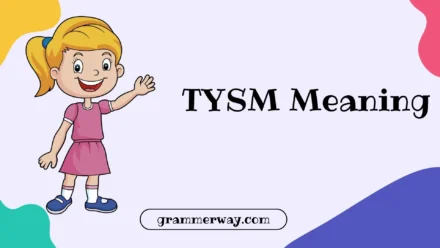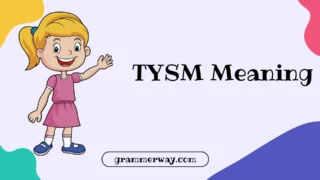When you tell someone to “make sure” of something, you’re asking them to be careful, check, or confirm that something happens the way it should. But sometimes, saying “make sure” can sound a bit too direct or mechanical. That’s why finding other ways to say “make sure” can help your words sound warmer, more caring, and more personal — whether you’re writing an email, talking to a friend, or giving advice with kindness. These thoughtful alternatives will help you express care and responsibility in a more human and meaningful way.
What Does “Make Sure” Mean?
The phrase “make sure” means to check, confirm, or ensure that something happens correctly or as intended. It shows that you care about accuracy, safety, and responsibility. For example, you might say “Make sure you lock the door” to show concern or caution.
Is It Professional/Polite to Say “Make Sure”?
Yes, “make sure” is both professional and polite in most situations. However, depending on the tone, it can sometimes sound a bit commanding or firm, especially in emails or workplace communication. That’s why it’s often better to use gentler alternatives like “please confirm,” “be certain,” or “double-check,” which still express care but sound more considerate and thoughtful.
Synonyms for “Make Sure”
- Ensure
- Double-check
- Be certain
- Verify
- Confirm
- Be sure
- Take care to
- Make certain
- Guarantee
- Check that
- Be mindful of
- Be attentive to
- Keep in mind
- Be sure to
- Look over
- Make it a point to
- Be diligent about
- Make it certain
- Be thorough
- Take steps to
1. Ensure
Meaning: “Ensure” means to make certain that something happens or is done correctly. It sounds formal, polite, and confident.
Scenario: Used often in professional or written communication to show responsibility and reliability.
Examples:
- Please ensure all the documents are ready before the meeting.
- Kindly ensure that everyone has received the invitation.
- We must ensure safety during this process.
- Ensure that all lights are turned off before leaving the office.
- I’ll ensure the report reaches you by tomorrow.
Tone: Professional, polite, and respectful.
Explanation: This word adds a sense of formality and trust, making your message sound responsible and well-considered. It’s ideal for emails, instructions, or official settings where you want to sound caring but professional.
2. Double-Check
Meaning: To look again carefully or review something twice to confirm accuracy.
Scenario: Used when you want to show careful attention or caution before making a decision.
Examples:
- Please double-check your answers before submitting the form.
- Can you double-check if the payment went through?
- I’ll double-check the schedule before confirming.
- Always double-check important details to avoid mistakes.
- Let’s double-check the date before we send the invitation.
Tone: Friendly, thoughtful, and caring.
Explanation: This phrase shows you value accuracy and reliability, and you’re encouraging others to do the same — not out of doubt, but out of care and attention.
3. Be Certain
Meaning: To be completely sure or confident that something is true or done right.
Scenario: Used when expressing the need for confidence or clarity before making a choice.
Examples:
- Be certain that your decision feels right for you.
- Please be certain the information you share is accurate.
- I want to be certain we’ve covered every point.
- Be certain all guests have RSVP’d before the event.
- Let’s be certain we understand each other clearly.
Tone: Reassuring and confident.
Explanation: Using “be certain” feels emotionally aware — it shows you want clarity while still respecting the other person’s ability to decide or check things.
4. Verify
Meaning: To check carefully to confirm something is true, correct, or complete.
Scenario: Used in professional or technical situations where accuracy and detail are important.
Examples:
- Please verify that your email address is correct.
- We need to verify all data before final approval.
- Can you verify the customer’s information for me?
- I’ll verify that the package has been delivered.
- Let’s verify these numbers to avoid any confusion.
Tone: Professional and precise.
Explanation: This phrase is perfect when you want to sound methodical and responsible. It shows care in a factual, detail-oriented way.
5. Confirm
Meaning: To check or prove something is correct, often to finalize a decision or plan.
Scenario: Common in both friendly and business communication to show certainty and politeness.
Examples:
- Could you please confirm the time of our meeting?
- I’d like to confirm your attendance for tomorrow’s event.
- Please confirm once you’ve received the package.
- Let’s confirm the booking before we leave.
- We need to confirm the order details to avoid mistakes.
Tone: Polite, professional, and warm.
Explanation: “Confirm” has a reassuring tone, showing you value clear communication and mutual understanding.
6. Be Sure
Meaning: A softer, more personal way to tell someone to make sure of something.
Scenario: Used in casual or caring communication.
Examples:
- Be sure to call me when you arrive safely.
- Be sure to take your umbrella — it might rain.
- Be sure you rest well before tomorrow’s event.
- Be sure to thank her for her help.
- Be sure you’ve packed everything you need.
Tone: Warm, caring, and friendly.
Explanation: This phrase adds emotional warmth. It sounds gentle and thoughtful, especially in personal messages.
7. Take Care To
Meaning: To act carefully and thoughtfully to avoid mistakes or harm.
Scenario: Often used to show empathy or concern.
Examples:
- Take care to read all instructions before starting.
- Take care to treat others with respect.
- Take care to lock the door when you leave.
- Please take care to handle this package gently.
- Take care to review your answers one more time.
Tone: Gentle, caring, and respectful.
Explanation: It feels like advice given with kindness and wisdom. It’s perfect when you want to express genuine care.
8. Make Certain
Meaning: To guarantee or secure that something happens correctly.
Scenario: Used in both personal and professional speech when you want to sound sure and confident.
Examples:
- Please make certain all guests have their seats reserved.
- Make certain the files are uploaded before midnight.
- I’ll make certain everyone knows the schedule.
- Make certain your name is on the list.
- Let’s make certain we finish this project on time.
Tone: Confident and reassuring.
Explanation: This phrase shows a strong sense of responsibility and assurance, making your communication clear and firm without sounding harsh.
9. Guarantee
Meaning: To promise or assure that something will happen as expected, often with confidence and reliability.
Scenario: Used when you want to express strong assurance or trust in your actions or decisions.
Examples:
- I can guarantee this method will bring better results.
- Please guarantee that the documents reach the client on time.
- We guarantee complete satisfaction with our services.
- I’ll guarantee this won’t happen again.
- You can guarantee everyone’s safety during the event.
Tone: Confident, assertive, and responsible.
Explanation: Using “guarantee” shows you’re making a firm commitment. It’s ideal in professional, business, or promise-based communication where reliability matters most.
10. Check That
Meaning: To review or look over something carefully to confirm it’s correct.
Scenario: Used casually or professionally when you want to make sure something is right before proceeding.
Examples:
- Please check that all items are included in the package.
- Check that your computer is connected to the internet.
- Check that everyone received the email.
- Kindly check that your name appears correctly on the list.
- Check that the form is signed before submission.
Tone: Polite, simple, and straightforward.
Explanation: This phrase is clear, easy to use, and less formal. It fits well when giving friendly reminders or short instructions.
11. Be Mindful Of
Meaning: To stay aware, attentive, and thoughtful about something or someone’s needs.
Scenario: Used when reminding someone to act with care, awareness, or empathy.
Examples:
- Be mindful of others’ opinions during the discussion.
- Please be mindful of the time limit.
- Be mindful of your tone when giving feedback.
- Be mindful of your surroundings at night.
- Let’s be mindful of our energy use.
Tone: Gentle, wise, and emotionally intelligent.
Explanation: This phrase expresses emotional warmth and awareness. It’s perfect when you want to sound kind and considerate, not controlling.
12. Be Attentive To
Meaning: To pay careful attention to details or responsibilities.
Scenario: Used when you want to remind someone to focus carefully on something important.
Examples:
- Be attentive to small details during proofreading.
- Please be attentive to the client’s needs.
- Be attentive to your posture during presentations.
- Be attentive to feedback — it helps you grow.
- Let’s be attentive to safety at all times.
Tone: Respectful, guiding, and supportive.
Explanation: This phrase is gentle yet serious. It communicates careful awareness and respect for quality or others.
13. Keep in Mind
Meaning: To remember something important before taking action or making decisions.
Scenario: Used to remind someone of an important fact, rule, or feeling.
Examples:
- Keep in mind that deadlines are strict this week.
- Keep in mind how sensitive this topic might be.
- Keep in mind that good communication builds trust.
- Keep in mind your audience while writing.
- Please keep in mind that everyone works differently.
Tone: Friendly, thoughtful, and understanding.
Explanation: It’s a soft and warm way to offer reminders without sounding commanding — perfect for everyday communication or gentle advice.
14. Be Sure To
Meaning: To remember or take care to do something important.
Scenario: Commonly used in friendly reminders or gentle guidance.
Examples:
- Be sure to back up your files regularly.
- Be sure to check the expiration date before use.
- Be sure to arrive early for the presentation.
- Be sure to follow up with the client.
- Be sure to rest after a long day.
Tone: Warm, kind, and encouraging.
Explanation: This phrase is one of the most friendly and human-sounding ways to say “make sure.” It balances care with confidence.
15. Look Over
Meaning: To review or examine something quickly but carefully.
Scenario: Used when asking someone to review documents, work, or information.
Examples:
- Please look over the draft before we send it.
- Look over your notes before the test.
- I’ll look over the presentation slides tonight.
- Could you look over this proposal for feedback?
- Look over the checklist before leaving the office.
Tone: Casual, friendly, and professional.
Explanation: It’s a light, non-demanding phrase that feels cooperative — ideal for teamwork or polite requests.
16. Make It a Point To
Meaning: To intentionally remember or prioritize doing something important.
Scenario: Used when expressing the importance of consistent care or effort.
Examples:
- Make it a point to thank people who help you.
- Make it a point to stay positive each morning.
- Make it a point to reply to all messages daily.
- Make it a point to read before bed.
- Make it a point to double-check important details.
Tone: Encouraging, mindful, and motivating.
Explanation: This phrase suggests habit and mindfulness, making it great for advice or personal growth discussions.
17. Be Diligent About
Meaning: To put consistent effort and care into checking or completing something.
Scenario: Used to show responsibility, focus, and steady attention.
Examples:
- Be diligent about updating your records regularly.
- Please be diligent about following the safety rules.
- Be diligent about maintaining your deadlines.
- Be diligent about reviewing your progress weekly.
- Be diligent about double-checking important data.
Tone: Serious, professional, and reliable.
Explanation: This phrase adds a sense of discipline and professionalism, showing commitment to doing things right every time.
18. Make It Certain
Meaning: To take action to guarantee that something happens successfully.
Scenario: Used in both casual and formal language to show control and certainty.
Examples:
- Please make it certain that all forms are complete.
- Make it certain everyone gets the memo.
- I’ll make it certain your order arrives on time.
- Make it certain our message is clear to everyone.
- Make it certain we review this before release.
Tone: Confident and decisive.
Explanation: It shows leadership and control while keeping a sense of trust and assurance.
19. Be Thorough
Meaning: To check carefully and completely without missing details.
Scenario: Used when accuracy and completeness are very important.
Examples:
- Please be thorough when reviewing this report.
- Be thorough in your research before presenting.
- We should be thorough with every client request.
- Be thorough while packing to avoid forgetting anything.
- Be thorough when proofreading your essay.
Tone: Professional, respectful, and careful.
Explanation: This phrase communicates excellence and responsibility, encouraging someone to give their full attention to the task.
20. Take Steps To
Meaning: To act or prepare in advance to make sure something happens.
Scenario: Used in formal or practical situations where planning or action is important.
Examples:
- Take steps to prevent future errors.
- Please take steps to improve communication.
- We should take steps to keep the workplace safe.
- Take steps to protect your privacy online.
- Take steps to ensure everyone feels included.
Tone: Formal, proactive, and responsible.
Explanation: This phrase expresses initiative and foresight, showing careful preparation for success.
Conclusion
Choosing other ways to say “make sure” helps your words sound more personal, caring, and professional. Whether you’re giving a reminder, showing concern, or writing an email, these alternatives help you express thoughtfulness and attention with kindness. The right phrase can turn a simple reminder into a message of trust, respect, and understanding — and that’s what thoughtful communication is all about.
FAQs
1. What can I say instead of “make sure” in a polite way?
You can say “please ensure,” “be sure,” “double-check,” or “confirm” — they sound polite and considerate.
2. What’s a formal alternative to “make sure”?
Formal options include “ensure,” “verify,” “confirm,” or “be diligent about.”
3. Can I use “make sure” in business emails?
Yes, but use it softly with “please” or replace it with “ensure” or “confirm” for a more professional tone.
4. What’s a casual way to say “make sure”?
Casual alternatives include “check that,” “be sure to,” “double-check,” or “keep in mind.”
5. Which phrase shows care and warmth?
Phrases like “be mindful of,” “take care to,” and “be sure to” sound naturally warm and caring.
Amelia Bennett is a language writer at GrammerWay who focuses on English grammar, writing clarity, and common language mistakes. She creates simple, practical guides to help readers write confidently and correctly.







Leave a Comment